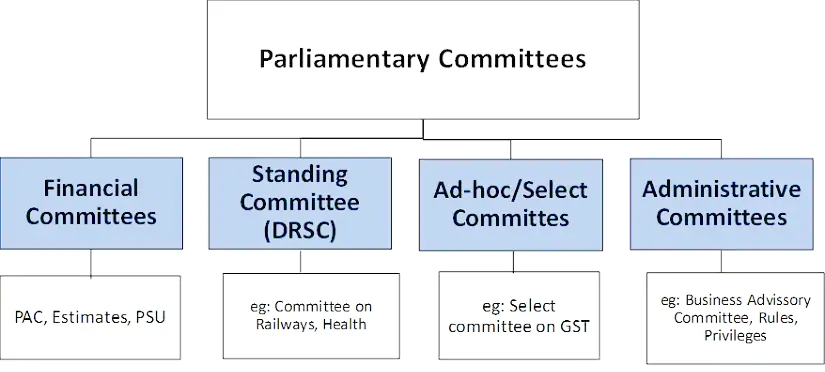Indian Polity
Public Accounts Committee (PAC)
- 04 Dec 2021
- 6 min read
Why in News
Recently, the Public Accounts Committee (PAC) has completed 100 years.
- PAC is one of the three Financial Parliamentary committees, the other two are the Estimates Committee and the Committee on Public Undertakings.
- Parliamentary committees draw their authority from Article 105 (on privileges of Parliament members) and Article 118 (on Parliament’s authority to make rules for regulating its procedure and conduct of business).
Key Points
- PAC:
- Establishment:
- The Public Accounts Committee was introduced in 1921 after its first mention in the Government of India Act, 1919 also called Montford Reforms.
- The Public Accounts Committee is now constituted every year under Rule 308 of the Rules of Procedure and Conduct of Business in Lok Sabha.
- Appointment:
- The Chairman of the Committee is appointed by the Speaker of Lok Sabha.
- It is to be noted that the Committee, not being an executive body, can only make decisions that are advisory by nature.
- The Chairman of the Committee is appointed by the Speaker of Lok Sabha.
- Members:
- It presently comprises 22 members (15 members elected by the Lok Sabha Speaker, and 7 members elected by the Rajya Sabha Chairman) with a term of one year only.
- Purpose:
- It was framed with the purpose of ascertaining whether money granted to the Government by the Parliament has been spent by the former within the “scope of demand” or not, the PAC restricts any Minister from being elected as a member of it.
- Functions:
- To examine the accounts showing the appropriation of the sums granted by the House to meet the expenditure, the annual Finance Accounts of the government and,
- Such other accounts laid before the House as the Committee may think fit except those relating to such Public Undertakings as are allotted to the Committee on Public Undertakings.
- Apart from the Reports of Comptroller and Auditor General of India (CAG) on Appropriation Accounts of the Government, the Committee examines the various Audit Reports of the CAG on revenue receipts, expenditure by various Ministries/Departments of Government and accounts of autonomous bodies.
- The Committee looks upon savings arising from incorrect estimating or other defects in procedure no more leniently than it does upon excesses.
- To examine the accounts showing the appropriation of the sums granted by the House to meet the expenditure, the annual Finance Accounts of the government and,
- Establishment:
- Importance of Parliamentary Committees:
- Provides Forum:
- Parliament deliberates on matters that are complex, and therefore need technical expertise to understand such matters better.
- Committees help with this by providing a forum where members can engage with domain experts and government officials during the course of their study.
- Build Consensus Across Political Parties:
- Committees also provide a forum for building consensus across political parties.
- The proceedings of the House during sessions are televised, and MPs are likely to stick to their party positions on most matters.
- Committees have closed door meetings, which allows them to freely question and discuss issues and arrive at a consensus.
- Examine Policy Issues:
- Committees also examine policy issues in their respective ministries, and make suggestions to the government.
- The government has to report back on whether these recommendations have been accepted or not.
- Based on this, the Committees then table an Action Taken Report, which shows the status of the government’s action on each recommendation.
- Provides Forum:
- Issues Arises by not involving the Committees:
- Weakening of Parliamentary System Government:
- A parliamentary democracy works on the doctrine of fusion of powers between parliament and the executive, but the Parliament is supposed to maintain oversight of the government and keep its power in check.
- Thus, by circumventing the Parliamentary committees in the passing of significant legislation, there is a risk of weakening democracy.
- Enforcing Brute Majority:
- In the Indian system, it is not mandatory for bills to be sent to committees. It’s left to the discretion of the Chair — the Speaker in the Lok Sabha and Chairperson in the Rajya Sabha.
- By giving discretionary power to the Chair, the system has been specially rendered weak in a Lok Sabha where the ruling party has a brute majority.
- Weakening of Parliamentary System Government:
Way Forward
- Parliament has the central role in our democracy as the representative body that checks the work of the government. In order to fulfil its constitutional mandate, it is imperative that Parliament functions effectively.
- Also, proper scrutiny of the bills is an essential requirement of quality legislation. Circumventing the parliamentary committees while passing legislations undermines the very spirit of democracy.







